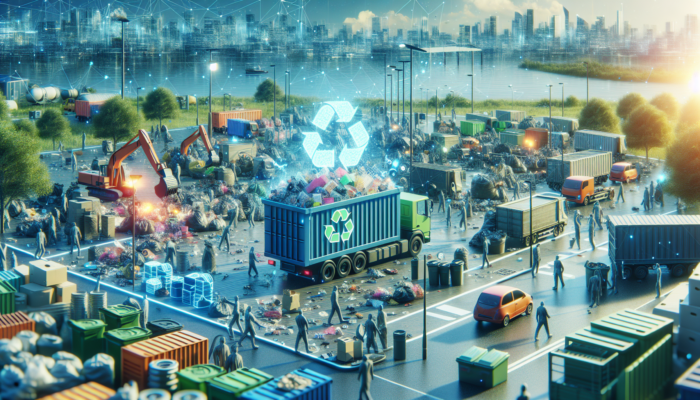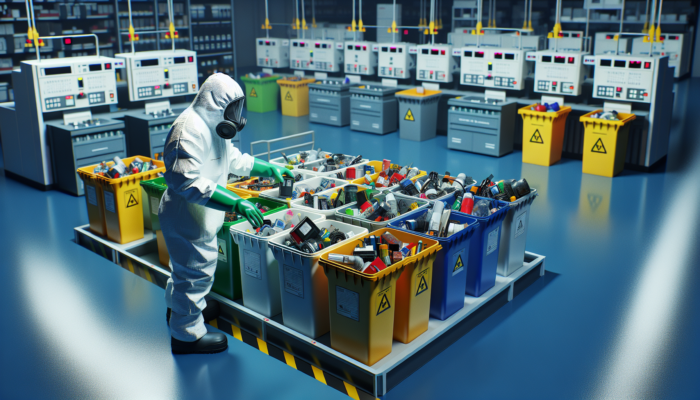Discover Effective Eco-Friendly Clearance Methods in the UK: Insights and Innovations
Recognizing the Significance and Benefits of Eco-Friendly Clearance

Eco-friendly clearance encompasses systematic methods aimed at removing unnecessary items or waste while prioritizing the minimization of environmental impact. This practice has gained critical importance in the UK, where escalating concerns over waste management and environmental sustainability are ever-present. The core of eco-friendly clearance techniques in the UK lies in adopting approaches that champion sustainability, reduce waste generation, and promote recycling. By implementing these methods, individuals and organizations not only adhere to regulatory standards but also play a significant role in fostering a healthier environment for current and future generations.
The staggering volume of waste produced annually in the UK underscores the pressing need for eco-friendly clearance methods. Inefficient waste disposal practices can result in dire environmental consequences, including soil contamination and the emission of potent greenhouse gases. Eco-friendly clearance tackles these challenges head-on by advocating for practices that emphasize recycling, reusing, and minimizing overall waste. By grasping the definitions and importance of these techniques, stakeholders can make well-informed decisions that align with their environmental aspirations while ensuring compliance with legal requirements.
Exploring Recent Developments in Sustainable Clearance Innovations
As environmental challenges continue to evolve, so too do the technologies and methodologies associated with eco-friendly clearance techniques in the UK. Recent advancements have unveiled more efficient, productive, and sustainable practices that revolutionize traditional clearance operations. For instance, the incorporation of groundbreaking waste management systems utilizing Internet of Things (IoT) technology enables the real-time monitoring of waste levels and optimizes collection routes, which significantly curtails fuel consumption and harmful emissions.
Moreover, the increasing use of biodegradable packing materials and state-of-the-art dismantling tools significantly boosts recycling and waste management practices, aligning perfectly with the eco-friendly principles. Additionally, enhancements in sorting technologies facilitate the effective separation of recyclable materials from waste, resulting in higher recycling rates and a diminished reliance on landfills. These innovations not only streamline operational workflows but also promote a more responsible and sustainable approach to waste management.
Comprehending the Legal Landscape: Compliance and Best Practices
The UK has developed a comprehensive legal framework governing waste management and clearance practices, which significantly impacts eco-friendly clearance techniques. Key regulations such as the Waste (England and Wales) Regulations 2011 and the Environmental Protection Act 1990 delineate the responsibilities of businesses and individuals regarding waste disposal. Adhering to these regulations is essential for any clearance operation, as it guarantees that waste is managed ethically and in a responsible manner.
In addition to national regulations, local councils impose specific guidelines and frameworks that must be followed, which can differ across regions. A thorough understanding of these regulations is crucial for anyone engaged in clearance operations; non-compliance can result in substantial fines and damage to reputations. By aligning their practices with legal stipulations, businesses can positively contribute to environmental sustainability while upholding their operational integrity.
Embracing Sustainable Waste Management Techniques for a Greener Future

Advancing Recycling and Upcycling Practices in Clearance Operations
Recycling and upcycling are fundamental components of the UK’s eco-friendly clearance techniques. Recycling involves processing materials to create new products, thereby reducing reliance on virgin resources. During clearance operations, identifying items suitable for recycling, such as metals, plastics, and paper, is crucial. By sorting these materials at the source, clearance companies can significantly cut down on landfill waste and elevate recycling rates.
Conversely, upcycling enhances the recycling process by creatively repurposing items instead of simply converting them back into raw materials. For instance, old furniture can be restored or transformed into new products, adding both aesthetic and functional value while minimizing waste. This practice not only conserves resources but also stimulates creativity and innovation within communities. The combined approaches of recycling and upcycling are vital for fostering a sustainable future, promoting a circular economy where waste is perceived as a valuable asset rather than a burden.
Implementing Effective Composting and Organic Waste Management Solutions
Managing organic waste effectively is a crucial aspect of sustainable waste management practices, particularly concerning eco-friendly clearance techniques in the UK. Composting is a natural process that converts organic materials, such as food scraps and garden waste, into nutrient-rich compost. This method not only reduces the volume of waste directed to landfills but also enhances soil health, promoting sustainable gardening and agriculture.
Integrating composting into clearance operations requires establishing designated compost bins for the collection of organic waste. To optimize efficiency, it is essential to train staff and inform clients about which materials can be composted. Additionally, local councils often offer resources and support for composting initiatives, encouraging participation from individuals and businesses in sustainable practices. By effectively managing organic waste through composting, clearance operations can significantly mitigate their environmental impact.
Ensuring Responsible Management of Hazardous Waste

The safe and eco-friendly handling of hazardous waste is paramount in any clearance operation. Hazardous materials, including chemicals, batteries, and electronic waste, necessitate specialized handling to prevent environmental contamination and health risks. Under UK legislation, businesses must adhere to strict regulations governing hazardous waste management to ensure responsible disposal practices.
Implementing proper training and protocols for hazardous waste management is essential. This encompasses identifying hazardous materials, utilizing appropriate protective equipment, and following established disposal procedures. Collaborating with certified hazardous waste disposal firms is often required, as they possess the expertise and resources needed to manage these materials safely. By prioritizing the eco-friendly handling of hazardous waste, clearance operations safeguard both environmental health and public safety while complying with legal standards.
Showcasing Practical Applications of Eco-Friendly Clearance Techniques in the UK
Sustainable Clearance Strategies for Residential Properties
Residential clearance presents distinct challenges and opportunities for applying eco-friendly clearance techniques in the UK. Homeowners can implement various strategies to ensure their clearance projects are both effective and sustainable. A practical approach involves decluttering, which entails evaluating personal belongings to pinpoint items suitable for donation, recycling, or repurposing. This practice not only minimizes waste but also supports local charities and enhances community welfare.
Furthermore, selecting eco-friendly clearance services can amplify sustainability efforts. Many companies now provide green clearance options that prioritize recycling and responsible waste disposal. Customers should seek out providers who hold certifications or affiliations with environmental organizations to confirm that their practices align with sustainability objectives. Additionally, homeowners can engage in community swap events, allowing them to exchange items with others and cultivate a reuse culture, thereby reducing the demand for new products.
Incorporating Sustainable Practices into Commercial Clearance Operations
Adopting eco-friendly clearance techniques in the commercial sector is a crucial element of corporate social responsibility (CSR) initiatives in the UK. Businesses can initiate sustainable practices by routinely assessing their waste generation and identifying areas for enhancement. This may involve evaluating waste streams and developing targeted recycling programmes tailored to the specific materials produced.
Moreover, weaving sustainability into office design can facilitate eco-friendly clearance. For instance, opting for modular furniture allows for easy disassembly and reuse or recycling, thereby minimizing waste during office relocations or renovations. Educating employees about waste reduction strategies and the importance of recycling fosters a culture of sustainability within the organization. By integrating eco-friendly clearance practices into their operations, businesses not only enhance their brand reputation but also contribute positively to the environment and society.
Green Practices for Construction Site Clearance
Construction site clearance presents significant environmental challenges, making eco-friendly clearance techniques essential in the UK. Green building practices advocate for the use of sustainable materials and methods throughout the construction lifecycle, including during site clearance. One effective strategy is conducting thorough site assessments before demolition, identifying materials that can be salvaged, reused, or recycled.
Utilizing eco-friendly demolition approaches, such as deconstruction, facilitates a more careful dismantling of structures, maximizing the recovery of valuable materials. This method contrasts sharply with traditional demolition practices, which often generate substantial waste. Additionally, implementing sustainable waste management procedures on construction sites, such as on-site sorting and recycling facilities, can considerably decrease the amount of waste sent to landfills. By prioritizing green methods in construction clearance, stakeholders can play a pivotal role in nurturing a more sustainable built environment.
Utilizing Technology to Enhance Eco-Clearance Operations
Implementing Digital Solutions for Improved Eco-Friendly Clearance
The integration of digital tools into clearance operations has revolutionized the application of eco-friendly clearance techniques in the UK. Numerous software platforms and applications now assist businesses in planning and executing clearance projects sustainably. These digital tools enable enhanced organization and tracking of waste materials, ensuring that recycling efforts are maximized while waste is minimized.
For example, waste management software can assist companies in monitoring their recycling rates and identifying areas needing improvement. Furthermore, mobile applications allow users to report waste collection needs, ensuring prompt service and reducing unnecessary trips that contribute to carbon emissions. By embracing digital technology, clearance operations can enhance efficiency, reduce their environmental footprint, and make informed decisions regarding waste management and sustainability.
Revolutionizing Clearance Operations through Automation and Robotics
The rise of automation and robotics is transforming the landscape of eco-friendly clearance techniques in the UK. Automated systems can streamline various processes within clearance operations, ranging from sorting to transportation, dramatically improving efficiency. Robotics can assist in separating recyclable materials from waste, ensuring that valuable resources are not lost during disposal.
Additionally, automated vehicles can optimize collection routes, reducing fuel consumption and emissions associated with waste transportation. The adoption of these technologies not only supports sustainability but also enhances safety at clearance sites by minimizing human exposure to hazardous materials. As automation technology continues to advance, its role in eco-friendly clearance operations is expected to expand, providing innovative solutions to longstanding challenges.
Employing Data Analytics for Sustainable Clearance Strategies
Data analytics plays a crucial role in optimizing eco-friendly clearance techniques in the UK. By analyzing waste trends and patterns, businesses can make data-driven decisions concerning resource allocation and waste management strategies. This analytical approach enables organizations to identify inefficiencies within clearance operations and implement targeted improvements.
For instance, analytics can highlight commonly wasted materials, prompting companies to adopt practices that minimize this waste. Furthermore, by tracking recycling rates and other sustainability metrics, organizations can evaluate the effectiveness of their eco-friendly initiatives. Integrating data analytics not only enhances operational efficiency but also reinforces the commitment to sustainability by providing actionable insights for continuous improvement.
Showcasing Successful Case Studies in Eco-Friendly Clearance
Urban Clearance Initiatives: Key Takeaways and Insights
Urban clearance projects offer valuable lessons regarding the application of eco-friendly clearance techniques in the UK. A prominent case study is the initiative launched by the London Borough of Hackney aimed at enhancing waste management and recycling rates. By implementing a comprehensive recycling programme and actively engaging the community in waste reduction efforts, Hackney achieved a notable increase in recycling participation and a reduction in contamination rates.
Moreover, the borough organized community pop-up events to educate residents about recycling and effective waste management practices. These initiatives not only encouraged community engagement but also fostered a culture of sustainability. The insights gained from Hackney’s successes can be replicated in other urban areas, highlighting the significance of community involvement and innovative waste management strategies in achieving eco-friendly clearance objectives.
Rural Clearance Initiatives: Exemplary Sustainability Practices
Rural communities often encounter unique challenges in implementing eco-friendly clearance techniques in the UK, yet successful initiatives can provide valuable frameworks for improvement. One noteworthy program is Scotland’s ‘Zero Waste’ initiative, which encourages rural communities to minimize waste through local recycling efforts. This initiative has effectively raised awareness and participation in sustainable practices by partnering with local councils and organizations.
This project underscores the necessity of tailored engagement strategies in rural areas where access to resources may be limited. Best practices from this initiative include establishing community recycling hubs and conducting educational sessions focused on waste management. By adopting these strategies, rural communities can enhance their eco-friendly clearance efforts and contribute to a more sustainable future.
Leading Corporate Responsibility: Pioneering Eco-Clearance Practices
Many companies across the UK have embraced their corporate social responsibility by incorporating eco-friendly clearance techniques into their operational practices. A notable example is a prominent retail chain that launched a comprehensive waste reduction program aimed at minimizing environmental impact. The company adopted strategies such as recycling packaging materials, donating unsold products, and actively involving employees in sustainability initiatives.
As a result of these efforts, the retailer significantly reduced its landfill waste and improved its overall sustainability performance. By sharing their success stories and best practices with other organizations, this company has inspired others in the industry to embrace eco-friendly clearance practices. This highlights the potential of corporate responsibility to drive meaningful change and foster sustainable practices across various sectors.
Fostering Education and Training for Enhanced Eco-Friendly Clearance
Advancing Professional Development in Eco-Clearance
With the growing demand for eco-friendly clearance techniques in the UK, the need for professional development in this field is increasing. Various courses and certifications are available for individuals specializing in eco-friendly clearance. These programs cover essential topics such as waste management regulations, recycling processes, and sustainable operational practices.
Investing in professional development enables individuals to enhance their expertise and skills, thereby increasing their marketability. Moreover, organizations that prioritize employee training can experience benefits such as greater operational efficiency, improved compliance, and an enhanced reputation. As the industry continues to evolve, ongoing education will be crucial in equipping professionals to address the challenges associated with sustainable clearance.
Engaging Communities through Awareness and Educational Initiatives
Raising awareness about the significance of eco-friendly clearance techniques in the UK is essential for promoting sustainable practices within communities. Local councils and organizations can launch community initiatives that focus on waste reduction, recycling, and responsible disposal methods. These initiatives can take various forms, including workshops, seminars, and informational campaigns designed to increase awareness and understanding.
Engaging communities through interactive events, such as clean-up days or recycling challenges, can further boost participation and knowledge regarding sustainable practices. By equipping individuals with the necessary information and resources for responsible waste management, communities can collectively work towards a greener environment. These educational and engagement initiatives are vital in promoting the adoption of eco-friendly clearance techniques at the grassroots level.
Collaborative Learning: Fostering Partnerships for Sustainable Development
The advancement of eco-friendly clearance techniques in the UK is greatly enhanced through collaborative learning and partnerships among businesses, educational institutions, and government bodies. These collaborations promote knowledge sharing and resource allocation, leading to more effective waste management strategies. By joining forces, stakeholders can develop best practices, conduct research, and implement innovative solutions that benefit the environment.
For example, industry partnerships can organize joint training programs, collaborate on research initiatives, or launch community projects focused on sustainability. By leveraging the strengths and expertise of each partner, these collaborations can create a more significant impact and drive progress toward eco-friendly clearance objectives. Collaborative learning encourages innovation and cultivates a sense of community and shared responsibility for sustainability.
Anticipating Future Trends in Eco-Friendly Clearance Techniques in the UK
Emerging Technologies Shaping Clearance Operations
As the environmental landscape evolves, emerging technologies are poised to revolutionize eco-friendly clearance techniques in the UK. Innovations such as artificial intelligence, machine learning, and blockchain technology are anticipated to enhance waste management processes and improve sustainability outcomes. For example, AI can refine sorting methods, ensuring high recycling rates by accurately identifying diverse materials.
Moreover, blockchain technology can enhance transparency and traceability in waste management, allowing stakeholders to track materials from disposal to recycling. These technological advancements not only boost operational efficiency but also promote greater accountability and compliance within clearance operations. As these trends unfold, it is essential for stakeholders to remain proactive and open to leveraging new technologies to enhance their eco-friendly clearance initiatives.
Policy Developments and Their Influence on Sustainable Practices
Expected changes in UK policy regarding waste management and sustainability will significantly affect eco-friendly clearance techniques. The government’s commitment to achieving net-zero emissions by 2050 emphasizes the necessity for robust waste management practices. New regulations and incentives focused on promoting recycling and minimizing landfill utilization will directly impact clearance operations.
Businesses must stay informed about these policy changes to ensure compliance and seize potential incentives for adopting sustainable practices. Furthermore, actively participating in discussions surrounding waste management policies can empower stakeholders to advocate for regulations that support eco-friendly clearance initiatives. By aligning their operations with evolving policies, businesses can contribute to a more sustainable future.
Consumer Demand and Market Dynamics Shaping the Future
The increasing consumer demand for sustainability is reshaping the landscape of eco-friendly clearance techniques in the UK. As awareness of environmental issues grows, individuals are increasingly seeking products and services that align with their values. This shift in consumer preferences presents both challenges and opportunities for businesses involved in clearance operations.
Companies that adopt sustainability and eco-friendly practices are likely to attract a larger, more environmentally-conscious customer base, while those that ignore these concerns may face backlash. Implementing sustainable clearance techniques not only meets consumer expectations but also enhances brand reputation and loyalty. As market dynamics continue to evolve, businesses must adapt their clearance strategies to fulfill the needs and preferences of eco-conscious consumers.
Addressing Common Questions About Eco-Friendly Clearance Techniques in the UK
What constitutes eco-friendly clearance techniques?
Eco-friendly clearance techniques involve the responsible removal of waste and unwanted items with minimal environmental impact, focusing on recycling, reusing, and responsible disposal practices.
How can I locate eco-friendly clearance services in the UK?
You can find eco-friendly clearance services by searching online for companies specializing in sustainable waste management, reading customer reviews, and verifying certifications in environmental practices.
Are eco-friendly clearance techniques more costly?
While certain eco-friendly methods may appear more expensive at first, they often lead to long-term savings through reduced landfill fees and improved resource recovery.
Which materials can be recycled during clearance operations?
Commonly recyclable materials include paper, cardboard, metals, plastics, and certain electronics. It's crucial to refer to local guidelines for specific recycling regulations.
How should hazardous waste be handled during clearance?
Hazardous waste requires careful management and disposal. To ensure safe and compliant handling, it is advisable to consult licensed hazardous waste disposal firms.
Can residential properties implement eco-friendly clearance practices?
Yes, homeowners can engage in eco-friendly clearance by responsibly decluttering, recycling, and utilizing services that prioritize sustainability in their operations.
What role does technology play in eco-clearance initiatives?
Technology enhances eco-clearance through improved waste tracking, sorting automation, and data analytics, fostering more efficient and sustainable waste management practices.
Are government policies influencing eco-friendly clearance practices?
Yes, evolving government policies aimed at promoting sustainability and reducing waste significantly impact the implementation of eco-friendly clearance practices throughout the UK.
How can communities participate in eco-friendly clearance initiatives?
Communities can engage in eco-friendly clearance by participating in educational programs, community clean-up events, and local recycling initiatives that encourage active participation and raise awareness.
What benefits does upcycling provide during clearance?
Upcycling minimizes waste by creatively repurposing items, conserving resources, and fostering a culture of sustainability while resulting in unique products and solutions.
Connect with us on Facebook!
The Article: Eco-Friendly Clearance Techniques for Sustainable Living in the UK Was First Found At https://birminghamhouseclearance.com
The Article Eco-Friendly Clearance Techniques for Sustainable Living Was Found On https://limitsofstrategy.com

Ah, eco-friendly clearance – the noble art of getting rid of stuff with all the elegance of a swan gliding across a pond (admittedly, a pond that’s being drained of plastic bottles). You’ve aptly highlighted the significance of minimizing environmental impact, which has become as essential as finding a parking space in the middle of town on a Saturday!